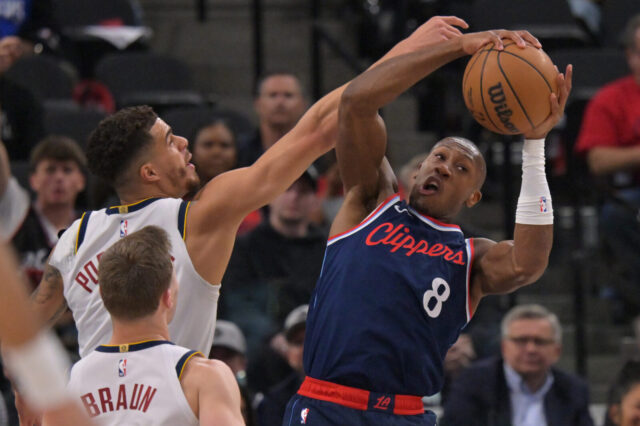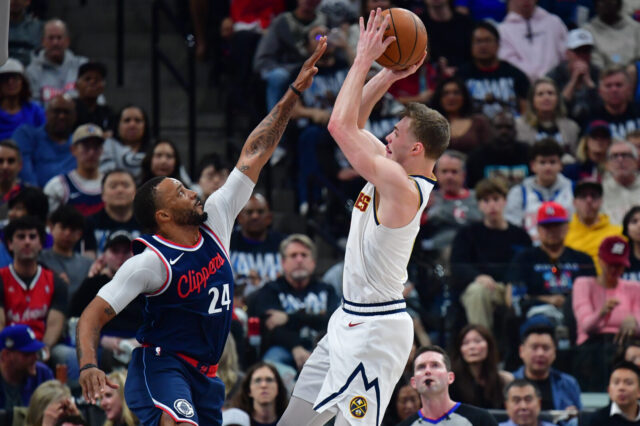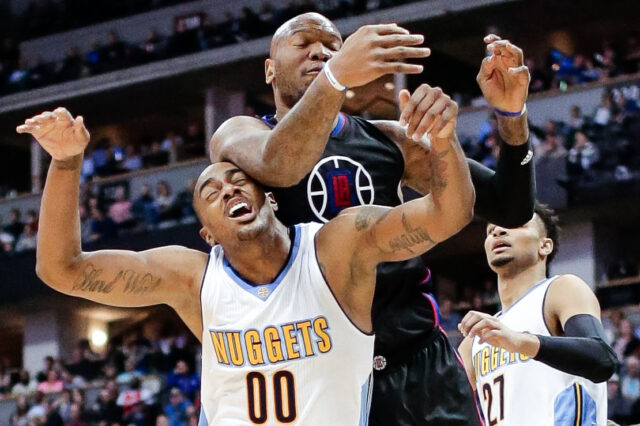Now that Eric Bledsoe is off the market and the Denver Nuggets have officially passed on adding any experienced and talented point guards to the roster in the near future, it feels like we should ask the question (again): so, uh, what exactly is the plan here? Can the Nuggets rely on their young point guards, or not?
Exhibit A from earlier this week:
Exhibit B, two days later:
"We're not going to skip steps," both President of Basketball Operations Tim Connelly and coach Michael Malone have intoned at various times. In the moment I thought they meant they would not sell all their good players for one short run at a title. Instead the Nuggets seem to be intent on keeping all of their young players together – even if Denver won't be able to pay them all and even if some of them won’t be ready to be significant playoff contributors for years – rather than spend any player currency on getting better now.
As Adam Mares noted in his Pickaxes and Os, the Nuggets are "set to live or die" by their young point guards, showing patience as they wait for them to improve. As any virtue taken to an extreme becomes a vice, however, so too can Denver's patience be damning by its inaction. Reluctance to commit fully to any approach wouldn’t be praise-worthy, it would be an indecisive and tepid response unworthy of the position they find themselves in after the gift of Nikola Jokic from the basketball gods.
But are these the actions of commitment-phobes, or the long-term plans of excellent talent evaluators? Emmanuel Mudiay IS getting better. Jamal Murray won’t shoot like a blindfolded drunkard from three-point range forever. When the consensus best player at your draft spot is also the youngest for multiple years in a row it creates the requirement for a patient approach.
It’s hard for Denver to switch tracks in the middle of the journey, though. The Nuggets can’t realistically trade for a point guard at the deadline if Plan A doesn’t work. Point guards struggle to give up control to Nikola Jokic, and with good reason: his game is unlike any other. That’s why it’s a decision that has to be made near the beginning of the season or not at all. Denver talked trades all summer, but in the end they chose to add Millsap and wait for results. It was a one-pronged approach to improvement (adding a good power forward) while betting on internal roster improvement to take care of the rest.
Most would-be contenders don’t make one choice and then coast on the idea that it will bring them everything they want, not even in fiction. Rocky was a dumb, humble club boxer who got a shot he never thought he'd get at the world title, and took full advantage. After all, it was his one shot at the champ, and he wasn't going to pass it up. Not with this kind of diet:
The Nuggets seem more than content to wait for the championship contenders to age out, however, while they munch on some kale and drink wheatgrass. Any bets on either Emmanuel Mudiay or Murray are long-term, next-contract ones, while their All-Star addition Paul Millsap is a short-term investment. Cutting Jameer Nelson right before the start of the season just exacerbates the problem – especially since Jokic apparently still talks to Nelson “almost every day.” That would be easier if they shared a locker room.
Still, there is nothing wrong with having both long-term and short-term investments in your portfolio. Diversity helps protect against market disasters or bad investments. As their flashes on the court keep demonstrating, neither Mudiay nor Murray are busts. It takes time for teenagers to adjust to the league, especially in roles with significant responsibilities and minutes. See: how the vaunted PG class of 2017 is working out the kinks so far. But all that on-the-job training conspires to limit their immediate impact, and reduces Denver’s ceiling for at least this year and potentially next year as well. It’s hard to win in the guard-driven NBA when point guard is your worst position.
Yes, Jokic is technically the team’s point, but he can’t defend against and score with all the top 1s in the league – and Millsap is definitely not a point guard. He has played a lot of traditional basketball and very little of it has been keyed around his personal passing ability. Millsap's a good passer, not a constant offense initiator, and asking him to be is setting him up to fail, or at least to delay his impact. And on the offensive end his impact has been somewhat delayed thus far.
Instead what you have is this:
That dude waaaaay on the upper right is Nikola Jokic, reluctant savior of Denver's franchise. Everybody else? Not big contributors, though you can see Harris and Barton trying to pick up the back court. It's a one-man show right now with moments of support elsewhere, and Denver isn't even emphasizing that show the way it could be. It's a graph reminiscent of the Milwaukee Bucks with Giannis Atentokoumpo or the Cavaliers with LeBron James. Unfortunately this is the Western Conference, not the Eastern, and one-man teams have a lower ceiling and a shorter shelf life.
But sometimes patience pays off. The Warriors kept their budding young core together, to the point of letting previous roster staples simply age out. Does Minnesota wish it had been slightly more patient with Chauncey Billups, who helped lead Detroit to the title the Timberwolves couldn’t manage with Kevin Garnett? Millsap and Jokic are just getting started on their multi-year partnership, and the guards may be catching on to their roles. Giving the young roster time to come into its own is not an unwinnable wager by any means.
Knowing who to bet on is one of the most important skills any front office can have, and right now Denver’s front office seems to be betting on themselves and their own draft acumen. These are the players they scouted, the players they wanted, and the players they believe can grow together into a contending core much like the Memphis Grizzlies did – with hopefully a higher ceiling. Many point guards break out around their age 23 or 24 seasons. Both of Denver’s current point guards are still years away from that timeframe. Does that mean a breakout is around the corner, or that Denver is foolish to wait that long?
In Dante’s Inferno near the entrance to hell there’s an antechamber that holds “the sorry souls of those who lived without disgrace and without praise.” Teresa of Ávila wrote that “patience achieves everything.” Whichever quote speaks to you about the state of the Nuggets probably says more about you than it does about them.
Luckily basketball is not a philosophy class; the results play out in real-time. Denver’s front office has made its investment philosophy clear: dance with the one that brought you, or in this case the ones you brought. Tim Connelly and Arturas Karnisovas have a demonstrated skill in locating draft talent, and are willing to wait for it to bear fruit – however long that takes. Hopefully the first robust crop at point guard gets harvested this year.


